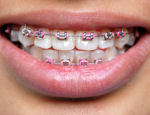
How to Become an Orthodontist
Orthodontists are the dental specialists in Orthodontics and Dentofacial Orthopedics who are uniquely educated and qualified to bring teeth, lips and jaws into proper alignment. Orthodontists are dentists who treat teeth positioning abnormalities described by the term “malocclusion” or “bad bite”. They use dental braces and other orthodontic appliances to realign and straighten teeth for functional or cosmetic reasons.
Why to choose a career in orthodontics?
Following a career in orthodontics is not only challenging but also rewarding :
- Financial rewards for the dental professionals who become orthodontists are significant. Average salary of an orthodontist in U.S. is close to $200,000. In other countries the orthodontists' income may not be that high, but it is always much higher than that of a general dentist.
- Orthodontists are also emotionally rewarded by providing better health, enhanced self-esteem and beautiful smiles to their patients
- Orthodontists are respected members of the community and health-care profession
- Demand for dental care, especially in the fields of orthodontics and cosmetic dentistry, will continue to be strong in the future, ensuring professional stability and security for those seeking an orthodontics career.
Education Requirements to become an Orthodontist (in U.S.)
All orthodontists are, first of all, dentists, so you have first to get the same training in a dental school required to become a dentist, and afterwards complete an additional 2-3 years orthodontics program.
Step 1: College
Before you can apply to a dental school to become a dentist, you must first have a bachelor's degree. Most dental schools prefer to admit students with at least a bachelor's degree; however, some will accept students with a minimum of two years of undergraduate education in a pre-dental or related program. A Bachelor's or Master's degree in medical or nursing science are the best choices for those who want to become a dentist or an orthodontist.
Step 2: Dental School
All dental school applicants should first take the Dental Admission Test (DAT) administered by the American Dental Association. Dental programs last an average of four years, and graduates earn a Doctor of Dental Surgery or a Doctor of Dental Medicine degree.
Step 3: Post-Doctorate Orthodontics Specialty Program
After completing a dental program, dentists who are interested to become an orthodontist may apply to orthodontic specialty programs. Most orthodontic programs last two to three years, during which time future orthodontists learn about the complex skills required to both manage tooth movement (orthodontics) and guide facial development (dentofacial orthopedics). Only dentists who have successfully completed this advanced specialty orthodontic education may call themselves orthodontists.
Step 4: Orthodontic Certification
The American Board of Orthodontics offers a voluntary certification to Orthodontists as a means to demonstrate proficiency after passing a written and clinical exam.
How long does it take to Become an Orthodontist?
Becoming an orthodontist requires a significant investment in time (and money) but it is worthy. The profession of orthodontist is financially rewarding and socially respected. You will need:
- 2-4 years of college
- 4-5 years of dental school
- 2-3 years of postgraduate orthodontics training
![]() The cost of orthodontic treatment can be significant and many patients may not afford it if they are not covered by their dental insurance.
Learn how to choose a dental insurance plan that will provide the best dental treatment to you and your family.
The cost of orthodontic treatment can be significant and many patients may not afford it if they are not covered by their dental insurance.
Learn how to choose a dental insurance plan that will provide the best dental treatment to you and your family.

